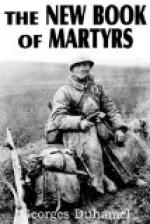And in truth the cup overflowed. This misfortune was too much. Tricot began to complain, and from that moment I felt that he was doomed.
I asked him several times a day, thinking of all his wounds: “How are you, old fellow?” And he, thinking of nothing but the pimple, answered always:
“Very bad, very bad! The pimple is getting bigger.”
It was true. The pimple had come to a head, and I wanted to prick it.
Tricot, who had allowed us to cut into his chest without an anaesthetic, exclaimed with tears:
“No, no more operations! I won’t have any more operations.”
All day long he lamented about his pimple, and the following night he died.
“It was a bad pimple,” said the orderly; “it was that which killed him.”
Alas! It was not a very “bad pimple,” but no doubt it killed him.
V
Mehay was nearly killed, but he did not die; so no great harm was done.
The bullet went through his helmet, and only touched the bone. The brain is all right. So much the better.
No sooner had Mehay come to, and hiccoughed a little in memory of the chloroform, than he began to look round with interest at all that was happening about him.
Three days after the operation, Mehay got up. It would have been useless to forbid this proceeding. Mehay would have disobeyed orders for the first time in his life. We could not even think of taking away his clothes. The brave man never lacks clothes.
Mehay accordingly got up, and his illness was a thing of the past.
Every morning, Mehay rises before day-break and seizes a broom. Rapidly and thoroughly, he makes the ward as dean as his own heart. He never forgets any corner, and he manages to pass the brush gently under the beds without waking his sleeping comrades, and without disturbing those who are in pain. Sometimes Mehay hands basins or towels, and he is as gentle as a woman when he helps to dress Vossaert, whose limbs are numb and painful.
At eight o’clock, the ward is in perfect order, and as the dressings are about to begin, Mehay suddenly appears in a fine clean apron. He watches my hands carefully as they come and go, and he is always in the right place to hand the dressing to the forceps, to pour out the spirit, or to lend a hand with a bandage, for he very soon learned to bandage skilfully.
He does not say a word; he just looks. The bit of his forehead that shows under his own bandages is wrinkled with the earnestness of his attention—and he has those blue marks by which we recognise the miner.
Sometimes it is his turn to have a dressing. But scarcely is it completed when he is up again with his apron before him, silently busy.
At eleven o’clock, Mehay disappears. He has gone, perhaps, to get a breath of fresh air? Oh, no! Here he is back again with a trayful of bowls. And he hands round the soup.




